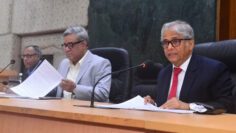WHO still seeking origins of the virus
A team of experts selected by the World Health Organization to investigate the origins of the virus that caused the COVID-19 pandemic returned last week from Wuhan, China, site of the world’s first outbreak. The team, having broken the ice with Chinese scientists, plans to produce a joint report on the possible origins of the virus.
Peter Daszak, a member of the WHO team and president of EcoHealth Alliance in New York, is primarily concerned with the animal origins of the virus. A specialist in animal diseases and their spread to humans, Daszak has worked with the Wuhan Virology Institute, a collaboration that last year prompted the Trump administration to cancel a grant to his organisation.
In an interview after his return to New York, he said that the visit had provided some new clues, which all of the scientists, Chinese and international, agreed most likely pointed to an animal origin within China or Southeast Asia. The scientists have largely discounted claims that the virus originated in a lab, saying that possibility was so unlikely that it was not worth further investigation.
He reflected on the atmosphere in Wuhan and his first glimpse of the seafood market where the initial outbreak occurred last year, although it was not the site of the first cases. He also said the path ahead would be straightforward scientifically, but not politically.
A transcript of the conversation, condensed and edited for length, follows:
Q: You’ve been to China and to Wuhan many times before. How was this different?
A: Well, this was weird. There’s certain things when you go into China that you’re supposed to do. The first thing you do is have a meeting and then have a meal. And if you don’t have a meal, it’s considered extremely rude. This time we spent two weeks in Zoom calls from our quarantine hotel. Then we went to meet in person and still didn’t have meals with our host. We had meals in a separate room.
So it was just a very difficult, very intense, very emotional trip. In Wuhan, there’s this feeling of post-traumatic shock.
The city went on lockdown, I think, 76 days. They were locked in their apartments — people died, and they didn’t know about it. And from then on, they’ve been accused of starting a pandemic, and it’s been called the Wuhan virus, the China virus, and there was just a sense of outrage and sadness.
Q: Did that make it difficult in terms of the scientific purpose of the trip?
A: No. You’ve got a task to do. You’ve volunteered. You know what it’s going to be like. You get caught up in the historical importance. I don’t know if we were the first foreigners to walk around the Huanan seafood market, which is blocked off even to Chinese citizens. The only people that have been in there have been the Chinese disease investigators. We met with the doctors that treated the first known COVID patients.
These people have been through harrowing conditions, and they’re now lauded as heroes in China, and then the rest of the world now is fighting that war. And China, of course, is absolutely petrified of this virus catching hold again.
When you arrive at the airport, they come on the plane in full PPE; you’re escorted down a separate quarantine pathway; you get tested. You’re driven to the hotel, you go in your room, and you’re locked in for two weeks. It’s just severe. The people who come to your door are in full PPE. The waste from your trash, from the hotel room, goes into a yellow bag with a biohazard sign on it.


















